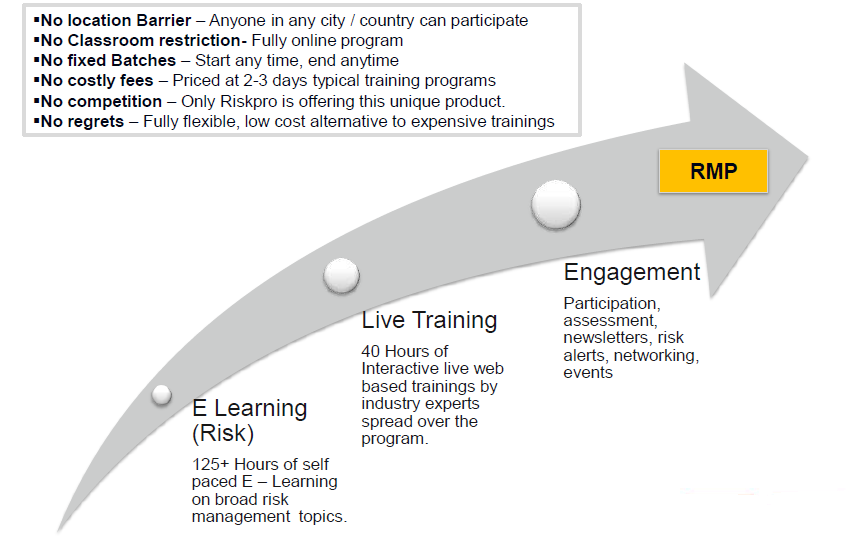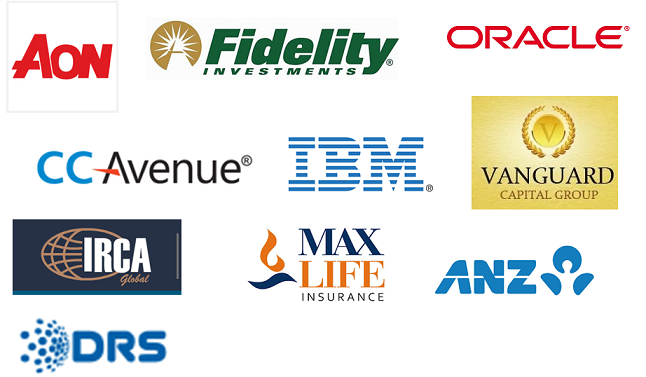
SPECIAL PRICING: A sheer value proposition with a price tag starting from Rs 11,000 (Rs 2,000 for RMP Exam only)
Risk Management is a growing specialisation that is integrating across almost all business function. Internal Audit remains at the Core of Risk Mitigation efforts. Besides internal audit, Compliance, Information Security, IT Governance, Corporate Governance, Finance all benefit from the effectiveness of Risk Management. Risk Management Certification in India and Risk Management Courses in India are not many. Educational Institutes are catching up to this requirement. A few that exist provide mostly Financial Risk Management courses. At Riskpro, we want to offer a broad based Risk Management Certification that ensures that a wider audience is able to benefit from this program. This is a self paced Online / interactive learning that is customised to bring the latest developments to the users.

The need for Risk Management Certification:
- Risk Management weakness is often highlighted as the core of all financial crisis. Every major event and fraud is a lapse in Risk Management
- Risk Management adds value to an organisation in the long term and in a sustained manner
- Training in Risk Management is often not present in current University and MBA syllabus.
- Risk Managers are often sought and well paid. These professionals are likely to play a major role in strategy implementation of any organization in the future
Riskpro Offering
- Riskpro introduces a unique Certification in Risk Management titled Risk Management Professional(RMP)
- RMP coves all aspects of risk management and not just focused on Banking Risk, Financial Risk. We believe that risk management is a holistic concept, not just restricted to banking/Insurance
- Just imagine almost 200 hours of risk related training, practical training, webinars, counseling, regular risk updates. You are constantly being exposed to risk management and will surely make you a true and well informed risk manager.
Download RMP Risk Certification Brochure
Alternatively, for more information, please email manoj.jain@riskpro.inView Demo on the RMP Course and a Video on the RMP Program features. (Click on youtube videos on right hand side menuSample - RMP users are employed with following companiesStill Reading.... Read on to learn more on the programWith approximately 200 Hours of learning, this programs gives you a value at the rate of Rs 90/hour of learning. Where else would you get risk management training (structured training with quiz, case studies and international standards) at this rate.
The course content is given below.
Subject Topic
Market Risk : Basic Level
1. Interest Rate Risk
2. Liquidity Risk
3. Equity Risk
4. Portfolio Risk
5. Foreign Exchange Risk
6. Commodity Risk
7. Regulatory Issues
8. Value at RiskBasics of Finance / Banking : Financial Mathematics
9. Bond Pricing
10. Probability Distributions and their Properties
11. Measuring Volatility
12. Correlation and Regression AnalysisGovernance : Global Banking Supervision
13. Core Principles and Methodology
14. Supervisory Self-Assessment
15. Corporate Governance in Banks
16. Internal Control System
17. Internal Audit in Banks
18. Supervisors and External Auditors
19. Operational Risk Management
20. Liquidity Management
21. Credit Risk Management
22. Management of Settlement Risk in Foreign Exchange
23. Trading and Derivatives Activities
24. Risk Management Principles for E-banking
25. Loan Accounting and Disclosure
26. Highly Leveraged Institutions
27. Dealing with weak banksBasel II University
28. Basel II - An Overview
29. Scope of Application
30. Credit Risk - Standardized Approach
31. Standardized Approach - Credit Risk Mitigation
32. Simplified Standardized Approach
33. IRB Approach - Overview
34. IRB Approach - Rules for Exposures
35. IRB Approach - Minimum Requirements
36. Credit Risk - Securitization Framework
37. Operation Risk Measurement Approaches
38. Qualifying Criteria for Operational Risk
39. Market Risk - Measurement Framework
40. Market Risk - Standardized Measurement Approach
41. Market Risk - Internal Models Approach
42. Key Principles
43. Specific Issues
44. Supervisory Review Process for Securitization
45. Market DisciplineCounterparty Credit Risk
46. Overview to Derivative Products-I
47. Overview to Derivative Products-II
48. Credit Exposure
49. Credit Risk in Derivative Products
50. Pre-settlement & Settlement Risk
51. Netting
52. Margin and Collateral Requirements
53. Monte Carlo Simulation
54. Case StudiesOperational Risk Management
55. Introduction to Operational Risk
56. Basic Concepts
57. Regulatory Treatment of Operational Risk under Basel-II
58. Operational Risk in Various Banking Sectors
59. Operational Risk in insurance
60. Developing objectives and identifying risks
61. Estimating potential losses – Data
62. Estimating potential losses – Loss distributions
63. Analyzing risks
64. Loss prediction and prevention
65. Loss control
66. Loss reduction and risk avoidance
67. Risk financing
68. Measurement framework
69. ORM in practice
70. Enterprise-wide Risk Management (ERM)
71. Basic and causal models
72. Legal risk and taxation rules
73. E-banking
74. Systems and software
75. Case study - BaringsAnti-Money Laundering / Know-Your-Client
76. What Is Money Laundering
77. International Initiatives
78. Customer Identification Program
79. USA Patriot Act
80. Wolfberg’s principles on correspondent banking
81. Terrorist related money laundering
82. Know your CustomerCorporate Governance
83. Overview
84. Models and Mechanisms
85. Shareholders and Stakeholders
86. Board of Directors
87. Audit Committee
88. Banking Corporate Governance
89. Corporate Scandals
90. Best Practices
91. Corporate ResponsibilityForeign Exchange Markets
92. Overview of Foreign Exchange Market
93. Spot Market
94. Forward Market
95. Determination of Exchange Rates
96. Currency Futures
97. Currency Options
98. Currency Swaps
99. Second Generation Forward Contracts
100. FX Trading ControlsSarbanes Oxley Act
101. Overview of Sarbanes-Oxley Act
102. Public Company Accounting Oversight Board
103. Auditor Independence
104. Corporate Responsibility
105. Enhanced Financial Disclosures
106. Analyst Conflicts of Interest
107. Commission Resources and Authority
108. Studies and Reports
109. Corporate and Criminal Fraud Accountability
110. White-Collar Crime Penalty Enhancements
111. Corporate Tax Returns
112. Corporate Fraud and AccountabilityTechnology and Security Risk
113. Internal Control in Banks
114. Banking Technology
115. Branch Security
116. Branch Security - Fraud AspectsGovernance, Risk & Compliance
117. Classification of Risks
118. Introduction to ERM and its Frameworks
119. Regulatory Landscape
120. Governance, Risk and Compliance - Demystified
121. COSO and CobiT in Support of GRC Needs
122. Operational Risk Management Primer
123. GRC - Case StudyTrading Operation Controls
124. Trade Life Cycle
125. Front Office Controls
126. Middle Office Controls
127. Back Office ControlsGeneral Risks and Analytics
128. Industry Risk
129. Business Risks
130. Financial Risks
131. Management Risks
132. Project RisksInsurance Risks
133. Insurance Concepts
134. Analysis and Evaluation of Risk Exposure
135. Actuarial Principles

